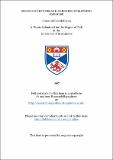Muscle stiffness and soreness following exercise
Abstract
It is in the best interests of sportsmen and sportswomen to try to avoid muscle stiffness and soreness. Apart from the discomfort experienced, muscle stiffness and soreness can cause unnecessary interruptions to training, may lead to injury and will reduce performance. Changes in muscle tone were quantified in terms of the Resonant Frequency (squared) (RF2) and the Amplitude of Movement (AM) in response to an applied torque. Muscle soreness was measured at twelve sites on the arm. Study One investigated the effects of a single bout of eccentric exercise on muscle stiffness and muscle soreness. RF2 increased and AM decreased following exercise and reached a maximum and minimum, respectively, 24-48 hours post exercise (p<0.01). Muscle soreness also reached a peak 24-48 hours post-exercise (p<0.01). Greatest soreness was in the biceps brachii and in the proximal ends of the brachioradialis and the flexor carpi radialis (p<0.01). Voluntary extension was more painful than voluntary flexion following eccentric exercise. Study Two investigated the effect of performing two subsequent exercise bouts (EX1 and EX2), each separated by six days and an adaptation was observed. Each of the variables measured (RF2, AM, Soreness, Creatine Kinase, Limb Girth) showed a reduced response following EX2 when compared to the results of EX1 (p<0.01). The resting angle of elbow flexion appeared to decrease following exercise. Study Three investigated the effect of muscle soreness on motor performance. The ability to perform a simple perception test was not affected while suffering from muscle soreness. The eccentric exercise is thought to cause damage to the connective tissue and muscle cell membrane leading to a build-up of fluid around the joint. This increased edema may explain the increase in muscle stiffness observed. Further research is required to determine whether changes in muscle tone are also observed following isometric and concentric exercise.
Type
Thesis, PhD Doctor of Philosophy
Collections
Items in the St Andrews Research Repository are protected by copyright, with all rights reserved, unless otherwise indicated.

